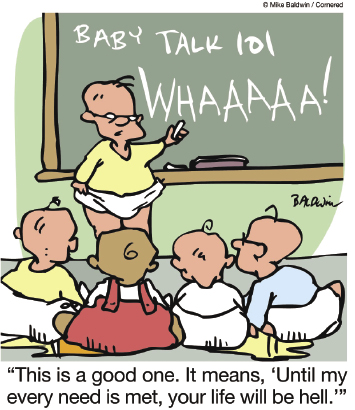Children, like most people, want to find the simplest and fastest answer. Once they learn a "regular" rule in a language, they assume that rule is always followed. This leads to a process called overgeneralization, which is "applying a regular morpheme to a stem that normally selects an irregular homoseme (Harley, 2006)." The child still has an understanding of the meaning and the function of the morpheme shown through their selection of a homoseme (a morpheme of the same meaning and function) of the correct morpheme. Overgeneralization stops when the child memorizes the irregular rules of their language.
Examples of overgeneralization include:
When attempting to say the plural of fish, a child says fishes instead of fish
Saying I goed to school yesterday instead of I went to school yesterday
The use of the word putted instead of put to express the past tense of the verb to put as seen in the carton below
When learning a new language children also tend to use one word to describe multiple different things. Referred to as overextension, this often results in frustration as parents struggle to figure out which of the meanings of the word their child is trying to convey at that moment. However it should be noted that overextension is not random. A child does not usually use a word like car to describe an animal at which he or she is looking. Instead, overextension is usually applied to the words with the same lexical category, showing the child is grouping words based on semantic similarity.
Examples of overextension include:
Referring to all four legged animals as dogs
Calling all types of fruit apples
The exaggerated and humorous example illustrated in the cartoon below (I apologize for the language!)

References
Alleydog.com. 2016. "Overextension." http://www.alleydog.com/glossary/definition.php?term=Overextension (accessed October 11, 2016)
Harley, Heidi. 2006. English Words: A Linguistic Introduction. Malden, MA. Blackwell.
No comments:
Post a Comment